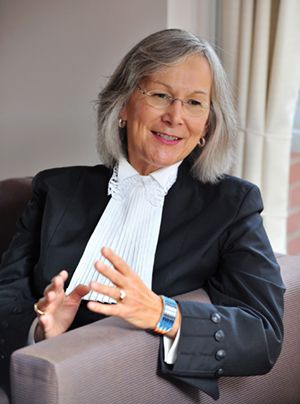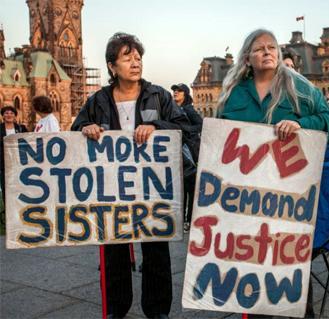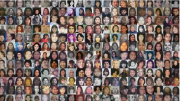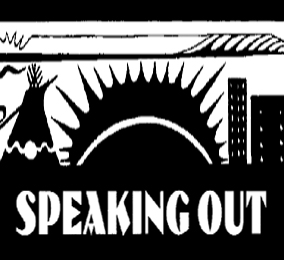On August 11, 2017 Marion Buller, Chief Commissioner of the National Inquiry on Missing and Murdered Indigenous Women and Girls issued this statement on the ongoing process:
I want to first and foremost uphold the spirits of our lost loved ones – the Indigenous women, girls, and LGBTQ2S people. As well I would like to raise my hands to the continued courage of survivors of violence, whose bravery absolutely humbles me.
The Commissioners – Michèle Audette, Brian Eyolfson, Qajaq Robinson, and I, would like to address several matters that have been brought to our attention by those whose input we value the most – family members and survivors.
Families, relations, and advocates – we are so grateful for your continued commitment to ensuring the National Inquiry honours our loved ones. This process is evolving – we are learning every day by seeking guidance from families, survivors, and advisory groups. We are committed to continuing this dialogue to ensure we are actively involving your voices in the process.
We, the Commissioners, are committed to fulfilling our mandate. We will continue to push the boundaries of the Terms of Reference set out by the federal government, and agreed to by 10 provinces and 3 territories. We have chosen to see the opportunities set out in this mandate rather than the limitations. We will utilize the powerful task given to us by Canadians to develop recommendations. This is our goal at the National Inquiry.
The National Inquiry framework is designed to achieve this goal by examining violence against Indigenous women, girls, and LGBTQ2S people. We will collect information through multiple paths of inquiry, including: community hearings, institutional hearings, and expert hearings; by examining past and current research; by collaborating with knowledge-holders; and through forensic analysis of official records. This information will be analyzed through a lens that highlights our women, girls, and LGBTQ2S people not as victims, but as holders of inherent human rights that are still being violated today. Our interdisciplinary research will be rooted in Indigenous methodology, and governed by traditional laws and ethics, that affirm the resilience, resistance and cultural resurgence of Indigenous women, girls, and LGBTQ2S people.
We are thankful for the continued voice of those who wish to see the National Inquiry succeed. In the interest of addressing some concerns from those groups, we would like to share the following information regarding our processes.
Health & Wellness
The National Inquiry is committed to ensuring the wellbeing of all participants. Our approach is rooted in guiding principles which lead our teams in promoting a sense of empowerment, safety and hope as families and survivors engage in the process of sharing their story with us. We continue to respect the choice of families and survivors by incorporating both Indigenous and Western approaches to healing and wellness. Providing choices is fundamental for respecting each participant’s right to decision making as it relates to their involvement in the Inquiry and path for healing.
There are over 450 families and survivors who have registered to participate within the current process. Beyond that, the National Inquiry continually receives letters from many families, survivors, advocates, and groups who have all expressed their support and acknowledge this work isn’t easy but want us moving forward in a good way.
Building the Team
The National Inquiry began on September 1st with just 5 Commissioners. We have in the past 10 months built our team to more than 50 individuals. Staff, many of whom are family members and survivors, have shown their dedication to the work of honouring the stories of lost loved ones and survivors.
The process of building our team from the ground up has been labour-intensive, and we acknowledge the timely process to hire staff within the National Inquiry. However, we are bound by the government of Canada’s hiring and security clearance processes. On average, it takes 4 months to hire new staff. Despite these delays, our priority has always been, and continues to be, ensuring the wellbeing of families and survivors who contact the National Inquiry.
Scheduling
Our priority will always be to engage with communities at a local level – including families, survivors, leadership, advocates, frontline workers, and grassroots organizations. This was particularly important when we determined the locations and dates for the fall 2017 community visits and hearings. Through these consultations we worked collaboratively to identify needs and considerations specific to each region, and ensured flexibility in our schedule should a community require it. We remain engaged with many communities across the country, and will continue to seek their guidance and advice. Further community hearing dates and locations for winter and spring 2018 will be announced in the coming months.
Document Collection
Our Legal team is procuring – through subpoenas where necessary – files from police authorities, governments, and institutions. We are also assembling a forensic police document review committee to analyze police conduct when it comes to reports of missing and murdered Indigenous women and girls. This creation is a centerpiece of our public investigation. The need for this committee was understood very early in our mandate, as we recognized the importance of shining light on police practices relating to investigations of violence against Indigenous women, girls, and LGBTQ2S people.
Standing
At this time, there are over 100 parties that have been granted standing within the Truth Gathering Process. These parties have been contacted, and an announcement of these parties is planned for the coming weeks. Beyond these numbers, we will have a second call for applications for standing in the coming months. Those granted standing in the second round of applications will be able to submit information to the Commissioners for their inclusion in the final report and recommendations.
Expert Hearing – Winnipeg
The National Inquiry will hold its first Expert Hearing in Winnipeg from August 22nd to 24th. The topic of this expert hearing is Indigenous Law and Decolonizing Perspectives.
As of today, confirmed experts include: Dr. Val Napoleon & Dr. Hadley Friedland – basic concepts of Indigenous law, Dawnis Kennedy – Anishinabe law and life experiences, Tuma Young – L’nuwey law, two-eyed seeing & Mi’kmaq worldviews, concepts & principles and Karen Drake – lead an Indigenous law talking circle.
The expert hearings are open to the public, and families and survivors are particularly welcome to attend to observe testimony. This hearing is for expert testimony, and is an opportunity for all to further educate themselves on the topic of Indigenous law and decolonizing perspectives.
Finally, we would like to recommit as an Inquiry to an inclusive, Indigenous-led, and community driven process. We have every intention to include your voices in this process as it is all of you who have dedicated your lives to advocating for justice for Indigenous women, girls, and LGBTQ2S people.
Sincerely,
Marion Buller, Chief Commissioner, Qajaq Robinson, Commissioner, Michèle Audette, Commissioner and Brian Eyolfson, Commissioner






Be the first to comment on "Update: National Inquiry on Missing and Murdered Indigenous Women"